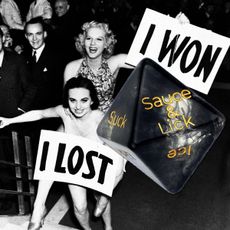
I met Kimball during the go-go '80s, a time of gaudy ego and reckless consumption, of stockbroker as rock star; how common it was to see bands of those raucous, self-satisfied moneymen in their striped power ties pouring out of bars after yet another world-beating bell-ringer of a day downtown.
Occasionally, I got caught up in it — we all did — dancing with boys in suits at cavernous fantasia clubs, choking down flavored vodka. But at heart, none of that was really me. The daughter of self-deprecating lefties, I knew I was little more than a tourist of the decade.
Kimball, whom I'd repeatedly glimpsed on campus during graduate school and finally met years later at a book party, was much more my type. Apart from his good looks (lean, with coat-hanger shoulders, a fetchingly craggy face, eyebrows that looked like they'd been woven from horsehair), he had deep knowledge about esoteric things like bookbinding, marine fossils, and Beat poetry; for our first date, he took me to see the Gutenberg Bible at New York's Morgan Library. He wore cool thrift-store suit jackets over sweaters with zippers; down the road, he calligraphed me love notes on handmade paper. Unlike the overstuffed, red-faced financial dudes who wore their ambitions so garishly, Kimball had mystique.
What he didn't have, however, was bank. Armed with that license to print money, a master's degree in library science, he worked as a rare-book expert at one of the big auction houses. And I loved and admired him for the expertise, the connoisseurship it took to do that job. But, as the '80s became the '90s and the tech-stock boom threatened to turn everyone around us into millionaires, Kimball's boho worldview was, for me, losing some of its allure. In truth, I wanted to live like a grown-up someday, with chairs and couches I hadn't hauled in from the sidewalk; I hoped to graduate, eventually, from a futon to a bed. Working long hours as an assistant at a magazine, frequently eating popcorn for dinner, I indulged in the archaic, sexist fantasy of a guy swooping in one day and taking me away from all that.
Was Kimball the guy to do it? The son of a man who compulsively switched off lights around the house and ground out a living by repossessing the TVs, couches, and cars of folks who couldn't pay their bills, Kimball had no appetite for the aggressive pursuit of a buck. Instead, he rid himself of the dirty stuff the moment he got his hands on some, always picking up the bar tab when out with friends — never mind that the tab might constitute a fair chunk of his salary. Kimball was the sort of guy who'd sooner gouge out his own eyeballs with a fork than publicly split a check and figure out the tax. As for the unseemly settling up one is expected to do each month with utility and credit-card companies, Kimball found it to be such an unremitting buzzkill, he tended those relationships haphazardly.
Of course, I brought fiscal baggage of my own to the relationship, growing up modestly in small-town Connecticut. Although my father held a day job at a publishing company for many years, he was really a frustrated novelist, and the deferral of his literary dreams was a source of constant, low-grade stress in the family. Although I revered him totally and grew up valuing the unmercenary, cultured pursuit, I also feared it; I knew how that kind of rarefied idealism could betray you. So much hinges on one's ability to earn — especially if one is a man. I simply wasn't eager to take on the disappointments and failings of yet another purist.
As such, my relationship with Kimball was dizzyingly on and off. During breakups that typically lasted a month or two, I'd set about dating a woolly array of seemingly more marriageable guys: the VPs and financial analysts who crowed about their investments over dinner and thwapped down the plastic as nonchalantly as if shooing a fly — guys whose pinstripes reeked equally of dry-cleaning chemicals and prosperity.
Stay In The Know
Marie Claire email subscribers get intel on fashion and beauty trends, hot-off-the-press celebrity news, and more. Sign up here.
But try as I might, I couldn't break free of Kimball, as circumstances repeatedly threw us into each other's path. One night I was at a restaurant on a date with someone when he walked in, alone. And I was so poleaxed by the sight of him, the date banter quickly dwindled to monosyllables. Soon after, Kimball and I actually left together, with the bemused blessing of the guy I'd come with. Even he could see we were meant for each other.
About six years into our checkered relationship, Kimball conquered his fear of convention and institutions long enough to actually propose marriage to me. The wedding, I like to think, was very us — spirited and classy in spite of itself, thanks to things money can't buy, like a sky full of stars and fireflies lighting a dance floor ringed by ancient hemlocks. In that generous, soul-expanding idyll, who could have known we were about to embark on the year of living stingily — in every sense?
It was my doing. Yes, I'd surrendered to my love for this man, but that didn't mean I couldn't fix him. So desperate was I to protect us — me — from financial peril, I chased down every penny that came and went from our home. With the stealth of someone who thinks she's being cheated on, I snuck peeks at Kimball's bank and credit-card statements and grilled him about them later. Did you pay it? When does the late fee kick in? Have you communicated with your creditors? When a limited-edition print or a book with a hand-tooled binding showed up, I interrogated him: Can we afford this? Having thrown my lot in with his, I made it my mission to put Kimball's financial affairs in order and transform him into a fit life partner.
Our first wedding anniversary arrived in June; we celebrated over dinner at a swish place downtown. Feeling giddy about the more or less good year we'd had, I raised my glass of champagne to him and proposed a bit of a parlor game: Let's each say what our big hopes and desires are for our marriage in the year to come.
Me first: Head cocked, I suggested something about communicating more fully and anticipating each other's needs. We clinked glasses and took a sip on that, amid the posh clatter of A-listers nibbling on miso cod.
Then came Kimball's turn.
He squared his shoulders and looked right at me. "My hope for this year is that you will get off my back about money," he said, lowering the champagne glass, his blue eyes turning stormy. "My hope is that you will stop hounding me about my credit cards and what I spend. Because if you don't, we're not going to make it."
Kimball leaned back in his chair, without breaking eye contact. "I'm 39 years old; I've been taking care of myself for a long time. And maybe I'm not perfect with money, but I'm not irresponsible. I've always had a roof over my head and everything I've needed. I'm fine. And you can love me or not — that's your choice. But you have to stop trying to change me, because it's not going to work."
It was a classic come-to-Jesus moment. I hadn't had them often, accustomed as I was to spackling over tensions with chitchat and rhetoric; there is very little I cannot rationalize, and it simply isn't like me to be rendered speechless. But that night was different. I felt the space between us growing, as if the table itself were pushing us apart; I saw Kimball hardening — saw the hairline cracks in his typically loving facade. I saw the damage I had done. Although he is so not the type to issue threats, the message was clear. I saw in that moment that I stood to lose everything.
"Okay," I said — nothing more. We clinked glasses.
In the dozen years since, amazing things have happened. Once it sunk in that acceptance, trust, and faith are the real mortar of a marriage, I eased up considerably on the nudging and the judging — even rolling with the occasional overdraft notice, the sort of thing that used to send me into a white-hot, hand-wringing, garment-rending freak-out. For his part, Kimball actually developed an interest in finance. Not only did he start making good money as an art adviser and appraiser, having parlayed a bone-deep passion into a wildly marketable skill — he even began gravitating to the stock pages and making appointments with besuited investment advisers with names like Mike. Unbelievably, Kimball is now in charge of our financial affairs — he's our liaison with the tax guy, our point person on estate matters — and doing a darn good job of it. We're fine. We own a three-bedroom apartment in Manhattan, for godsake. The wolves simply aren't at the door.
Did he take all of this on for me? Maybe, in part — I can be a pest, but never a monster, and I know he wanted things between us to work out. But we also had a baby on the way, and it's amazing how the mere idea of that can transform a person.
Most important, with me off his back, Kimball could grow and change on his own, as opposed to being pruned into some unnatural shape. I shouldn't have been so surprised that this is all it would take; a year earlier, after much haranguing on my part to get him to give up cigarettes, he quit cold turkey — while out of town for a few weeks on business, alone and away from me.
Not that he'll be donning tweed and nestling into a club chair anytime soon. I still count on Kimball, now the fit and happy father of two, for his defiantly offbeat take on what it means to be the man of the house — whether he's papier-mâché-ing cereal boxes in the kitchen with the kids, reading them some elliptical verse by way of a bedtime story, or defending my son's right not to get a haircut. Kimball is a great provider in the deepest sense of the word. As for the lesson in real love he taught me, I'll always be in his debt.
Lucy Kaylin is MC's executive editor. Her essay is adapted from The Secret Currency of Love: The Unabashed Truth About Women, Money, and Relationships, a collection of essays edited by Hilary Black, out this month.
-
 Melissa McCarthy Defends Meghan Markle From Critics Who Are "Threatened" by Her
Melissa McCarthy Defends Meghan Markle From Critics Who Are "Threatened" by HerMcCarthy once starred in the duchess' 40th birthday video.
By Iris Goldsztajn Published
-
 Zendaya Says She Might Just "Go Away for a While" During 'Euphoria' Hiatus
Zendaya Says She Might Just "Go Away for a While" During 'Euphoria' HiatusRest is best!
By Iris Goldsztajn Published
-
 Celebrate Earth Month With Our Feel-Good Fashion Report
Celebrate Earth Month With Our Feel-Good Fashion ReportYour guide to being more sustainable in 2024.
By Anneliese Henderson Published
-
 The 22 Best Vibrators, According to Sex Toy Experts
The 22 Best Vibrators, According to Sex Toy ExpertsThe best options, for every preference and price range.
By Gabrielle Ulubay Last updated
-
 The Best Period Sex Tips, According to Sex Experts
The Best Period Sex Tips, According to Sex ExpertsWho says messy can't be sexy?
By Gabrielle Ulubay Last updated
-
 The 20 Best Sex Games for Couples in 2023
The 20 Best Sex Games for Couples in 2023Who said game nights need to be wholesome?
By Gabrielle Ulubay Last updated
-
 The 14 Best Lubes for Every Need
The 14 Best Lubes for Every NeedGood sex should always go smoothly.
By Gabrielle Ulubay Last updated
-
 30 Female-Friendly Porn Websites for Any Mood
30 Female-Friendly Porn Websites for Any MoodAll the best websites, right this way.
By Kayleigh Roberts Published
-
 The 82 Best Cheap Date Ideas for Couples on a Budget
The 82 Best Cheap Date Ideas for Couples on a Budget"Love don't cost a thing." —J.Lo
By The Editors Last updated
-
 Diary of a Non-Monogamist
Diary of a Non-MonogamistRachel Krantz, author of the new book 'Open,' shares the ups and downs of her journey into the world of open relationships.
By Abigail Pesta Published
-
 COVID Forced My Polyamorous Marriage to Become Monogamous
COVID Forced My Polyamorous Marriage to Become MonogamousFor Melanie LaForce, pandemic-induced social distancing guidelines meant she could no longer see men outside of her marriage. But monogamy didn't just change her relationship with her husband—it changed her relationship with herself.
By Melanie LaForce Published